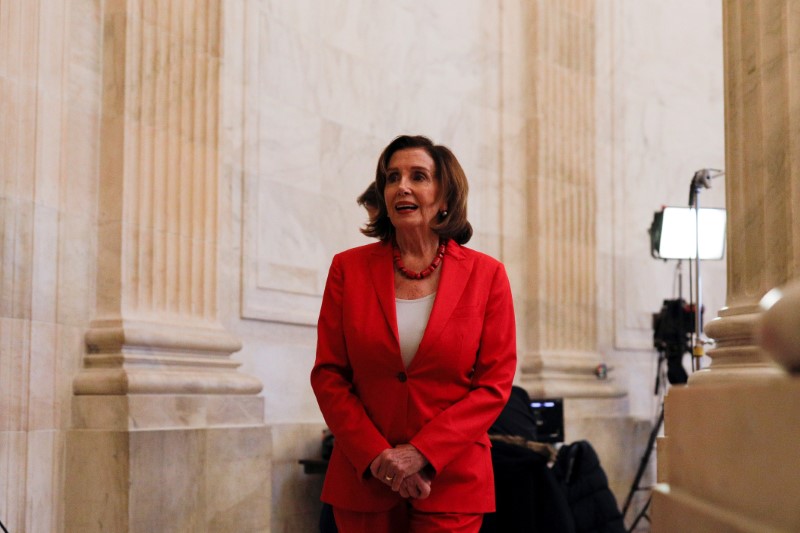By David Morgan and Richard Cowan
WASHINGTON (Reuters) - U.S. House Speaker Nancy Pelosi said she expected the chamber to pass an estimated $2.2 trillion coronavirus relief bill when it meets on Friday, after the Senate overwhelmingly approved the unprecedented economic rescue legislation Wednesday evening.
"Tomorrow we’ll bring the bill to the floor. It will pass with strong bipartisan support," Pelosi, a Democrat, told reporters.
The legislation will rush direct payments to Americans within three weeks once the Democratic-controlled House passes it and Republican President Donald Trump signs it into law, Treasury Secretary Steven Mnuchin said.
The Republican-led Senate approved the bill - which would be the largest fiscal stimulus measure ever passed by Congress - by 96 votes to zero late on Wednesday, overcoming bitter partisan negotiations and boosting its chances of passing the House.
The unanimous Senate vote, a rare departure from bitter partisanship in Washington that followed several days of wrangling, underscored how seriously members of Congress are taking the global pandemic as Americans suffer and the medical system reels.
"When there's a crisis of this magnitude, the private sector cannot solve it," Senate Democratic Leader Chuck Schumer said.
"Individuals, even with bravery and valor, are not powerful enough to beat it back. Government is the only force large enough to staunch the bleeding and begin the healing."
The package is intended to flood the country with cash in an effort to stem the crushing impact on the economy of an intensifying pandemic that has killed about 1,000 people in the United States and infected nearly 70,000.
Pelosi said there was no question more money would be needed to fight the coronavirus. She said House committees would be working on the next phase in the near term, even if the full chamber is not in session. She said lawmakers would need to be on call for possible votes.
House Republican Leader Kevin McCarthy also backs the relief plan, but said he wanted it to be allowed to work before deciding whether more legislation was needed.
"This will be probably the largest bill anybody in Congress has ever voted for," he told reporters.
Only two other countries, China and Italy, have more coronavirus cases than the United States. The World Health Organization has warned the United States looks set to become the epicenter of the pandemic.
The American government's intervention follows two other packages that became law this month. The money at stake amounts to nearly half of the total $4.7 trillion the federal government spends annually.
Trump, who has promised to sign the bill as soon as it passes the House, expressed his delight on Twitter. "96-0 in the United States Senate. Congratulations AMERICA!" he wrote.
Pelosi said House leaders were planning a voice vote on the rescue plan on Friday, but said leaders would be prepared for other contingencies. She had said a day earlier that if there were calls for a vote recorded by name, lawmakers might be able to vote by proxy, as not all would attend.
"If somebody has a different point of view (about the bill), they can put it in the record," she said, referring to the Congressional Record.
McCarthy predicted the measure would pass Friday morning following a debate.
The massive bill, worth more than $2 trillion, includes a $500 billion fund to help hard-hit industries and a comparable amount for direct payments of up to $3,000 apiece to millions of families.
The legislation will also provide $350 billion for small-business loans, $250 billion for expanded unemployment aid and at least $100 billion for hospitals and related health systems.
The House has 430 members, most of whom have been out of Washington since March 14. Many want to return for the vote, but for all to attend would be difficult, given that at least two have tested positive for the coronavirus, a handful of others are in self-quarantine, and several states have issued stay-at-home orders. There are five vacant House seats.

The Senate's No. 2 Republican, John Thune, missed Wednesday's vote because he was not feeling well. His spokesman said Thune, 59, flew back to his state, South Dakota, on a charter flight Wednesday, accompanied by a Capitol Police officer and wearing a mask.